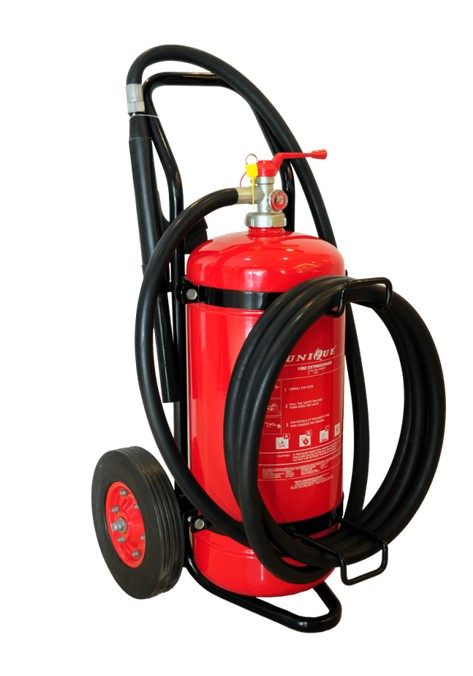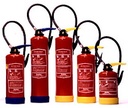FIRE EXTINGUISHER powder, class ABC, 25kg, on trolley
Valid Article
FIRE EXTINGUISHER
Definition
Handheld device containing an extinguishing agent, used to put out small fires.
Specifications
- Steel cylindrical vessel with flexible tube, flow regulation lever and gas cartridge
- With handle to carry the extinguisher and to pierce the cartridge
- Foam and powder extinguishers should have a pressure gauge, indicating the operable range of the device
- The extinguisher must display the following information:
- the brand and type
- the name and address of the manufacturer
- instructions for use
- the type of fire it will extinguish
- the extinguishing agent
- the weight of the charge
- the symbol forbidding its use on electrical fires (if applicable)
- Label with space to note the dates when annual checks are required
Dry powder extinguishers
For fires in category A, B or C (solids, liquids and gases).
These extinguishers will put out a fire quicker than other types, but may not necessarily completely extinguish it. They are also the only type that can be used at temperatures of less than 0 ºC and for electrical fires of over 1000 V. However, they do cause a lot of damage as the abrasive powder gets everywhere, and becomes corrosive when mixed with water.
Foam extinguishers (water + additive)
For fires in category A or B (solids and liquids).
These work more slowly than powder extinguishers, but are the only type capable of totally extinguishing a liquid fire without risk of reignition. Moreover, the foam has a destructive effect on liquid fuels and lowers their temperature below ignition point.
CO2 extinguishers (dry ice)
These extinguishers are ineffective on solid fires as they do not extinguish the embers. They are not very effective on liquid fires, as these can reignite a few seconds after being put out. Their usefulness lies in their ability to cool overheated electrical appliances. They can also be used to separate someone who is being electrocuted from the power source responsible. They have no corrosive effect and leave no residue after use (ideal for electrical control and computer rooms).
Instructions for use
Fire extinguishers must be placed in open, highly visible and easily accessible places.
Ideally they should be located on main routes through the building:
- fixed at a height of ± 1 m
- clearly signposted
- in a quantity appropriate to the floor area and the fire risks of the premises to be protected.
A fire extinguisher is a device intended for putting out or controlling a fire that is just beginning. It is not intended for putting out a well-established fire – that is a job for the fire brigade!
Using a fire extinguisher is only one way of responding to a fire. You should consider whether to evacuate rooms, call the emergency services or turn off the energy supply (gas, electricity), ventilation, air conditioning and any other technical installation, before picking up a fire extinguisher.
For maximum effectiveness, an extinguisher should preferably be used by someone who knows its characteristics and is familiar with its use.
Used incorrectly, an extinguisher can put the user in danger and increase the risks posed by the fire (for example by spreading fuel around, or creating a cloud of powder that may explode).
An extinguisher's effectiveness depends on how quickly it is used. Speed of response can be improved by installing smoke detectors in the building.
MSF requirements
Cartridge fire extinguisher, easily dismantled, and able to be checked for good working order by a logistician.




